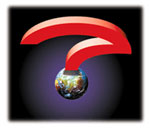"Spiders 2013" by Katinka Matson [expand] | katinkamatson.com
Richard Dawkins' “meme” became a meme, known far beyond the scientific conversation in which it was coined. It’s one of a handful of scientific ideas that have entered the general culture, helping to clarify and inspire.
The Edge 20th Anniversary Annual Question

"WHAT SCIENTIFIC TERM OR CONCEPT OUGHT TO BE MORE WIDELY KNOWN?"
Of course, not everyone likes the idea of spreading scientific understanding. Remember what the Bishop of Birmingham’s wife is reputed to have said about Darwin’s claim that human beings are descended from monkeys: "My dear, let us hope it is not true, but, if it is true, let us hope it will not become generally known."
Of all the scientific terms or concepts that ought to be more widely known to help to clarify and inspire science-minded thinking in the general culture, none are more important than “science” itself.
Many people, even many scientists, have traditionally had a narrow view of science as controlled, replicated experiments performed in the laboratory—and as consisting quintessentially of physics, chemistry, and molecular biology. The essence of science is conveyed by its Latin etymology: scientia, meaning knowledge. The scientific method is simply that body of practices best suited for obtaining reliable knowledge. The practices vary among fields: the controlled laboratory experiment is possible in molecular biology, physics, and chemistry, but it is either impossible, immoral, or illegal in many other fields customarily considered sciences, including all of the historical sciences: astronomy, epidemiology, evolutionary biology, most of the earth sciences, and paleontology. If the scientific method can be defined as those practices best suited for obtaining knowledge in a particular field, then science itself is simply the body of knowledge obtained by those practices.
Science—that is, reliable methods for obtaining knowledge—is an essential part of psychology and the social sciences, especially economics, geography, history, and political science. Not just the broad observation-based and statistical methods of the historical sciences but also detailed techniques of the conventional sciences (such as genetics and molecular biology and animal behavior) are proving essential for tackling problems in the social sciences. Science is nothing more nor less than the most reliable way of gaining knowledge about anything, whether it be the human spirit, the role of great figures in history, or the structure of DNA.
It is in this spirit of scientia that Edge, on the occasion of its 20th anniversary, is pleased to present the Edge Annual Question 2017. Happy New Year!
—John Brockman, Editor, January 1, 2017
[206 contributors; 143,000 words:] Scott Aaronson, Anthony Aguirre, Adam Alter, Ross Anderson, Samuel Arbesman, Simon Baron-Cohen, Lisa Feldman Barrett, Thomas Bass, Nicolas Baumard, Gregory Benford, Jeremy Bernstein, Laura Betzig, Susan Blackmore, Giulio Boccaletti, Ian Bogost, Joshua Bongard, Raphael Bousso, Stewart Brand, David M. Buss, Jimena Canales, Nicholas Carr, Sean Carroll, Leo Chalupa, Ashvin Chhabra, Jaeweon Cho, Nicholas A. Christakis, Brian Christian, David Christian, George Church, Andy Clark, Gregory Cochran, Jerry A. Coyne, Helena Cronin, David Dalrymple, Richard Dawkins, Aubrey de Grey, Luca De Biase, Sarah Demers, Daniel C. Dennett, Emanuel Derman, David DeSteno, Diana Deutsch, Keith Devlin, Jared Diamond, Rolf Dobelli, Scott Draves, George Dyson, Nick Enfield, Brian Eno, Juan Enriquez, Nancy Etcoff, Dylan Evans, Daniel Everett, Christine Finn, Stuart Firestein, Helen Fisher, Tecumseh Fitch, Jessica Flack, Steve Fuller, Howard Gardner, Michael Gazzaniga, James Geary, Amanda Gefter, Neil Gershenfeld, Gerd Gigerenzer, Bruno Giussani, Nigel Goldenfeld, Dan Goleman, Beatrice Golomb, Alison Gopnik, Kurt Gray, Tom Griffiths, June Gruber, Hans Halvorson, Sam Harris, Cesar Hidalgo, Roger Highfield, W. Daniel Hillis, Michael Hochberg, Donald Hoffman, Jim Holt, Bruce Hood, Daniel Hook, John Horgan, Sabine Hossenfelder, Nicholas Humphrey, Joichi Ito, Nina Jablonski, Jennifer Jacquet, Matthew O. Jackson, Kate Jeffery, Koo Jeong A, Gordon Kane, Stuart Kauffman, Kevin Kelly, Katherine Kinzler, Gary Klein, Jon Kleinberg, Brian Knutson, Bart Kosko, Stephen Kosslyn, Kai Krause, Lawrence Krauss, Coco Krumme, Robert Kurzban, Peter Lee, Cristine Legare, Martin Lercher, Margaret Levi, Janna Levin, Daniel Lieberman, Matthew Lieberman, Andre Linde, Antony Garrett Lisi, Mario Livio, Seth Lloyd, Tania Lombrozo, Jonathan B. Losos, Ziyad Marar, John Markoff, Chiara Marletto, Barnaby Marsh, Abigail Marsh, Ursula Martin, John C. Mather, Ian McEwan, Hugo Mercier, Yuri Milner, Read Montague, Richard Muller, Priyamvada Natarajan, John Naughton, Rebecca Newberger Goldstein, Richard Nisbett, Tor Nørretranders, Michael Norton, Peter Norvig, Hans Ulrich Obrist, James J. O'Donnell, Steve Omohundro, Bruce Parker, Irene Pepperberg, Clifford Pickover, Steven Pinker, David Pizarro, Robert Plomin, Ernst Pöppel, William Poundstone, Robert Provine, Richard Prum, Matthew Putman, Steven Quartz, David Queller, Sheizaf Rafaeli, Lisa Randall, Abbas Raza, Azra Raza, Martin Rees, Diana Reiss, Siobhan Roberts, Daniel Rockmore, Andrés Roemer, Phil Rosenzweig, Carlo Rovelli, David Rowan, Doulgas Rushkoff, Paul Saffo, Eduardo Salcedo-Albarán, Buddhini Samarasinghe, Robert Sapolsky, Roger Schank, Maximilian Schich, Laurence C. Smith, Simone Schnall, Bruce Schneier, Oliver Scott Curry, Gino Segre, Charles Seife, Terrence J. Sejnowski, Eldar Shafir, Michael Shermer, Seth Shostak, Gerald Smallberg, Lee Smolin, Dan Sperber, Paul Steinhardt, Victoria Stodden, Rory Sutherland, Melanie Swan, Tim Taylor, Max Tegmark, Richard Thaler, Frank Tipler, John Tooby, Eric Topol, Barbara Tversky, Athena Vouloumanos, Adam Waytz, Eric Weinstein, Linda Wilbrecht, Frank Wilczek, Jason Wilkes, Elizabeth Wrigley-Field, Victoria Wyatt, Itai Yanai, Dustin Yellin
Thanks to William Poundstone for suggesting this year's Question, and to Stewart Brand, Kevin Kelly, George Dyson, and Nicholas Humphrey for their continued support over the past 20 years.
[Click here for the full media coverage of the Edge 2017 Question]



















